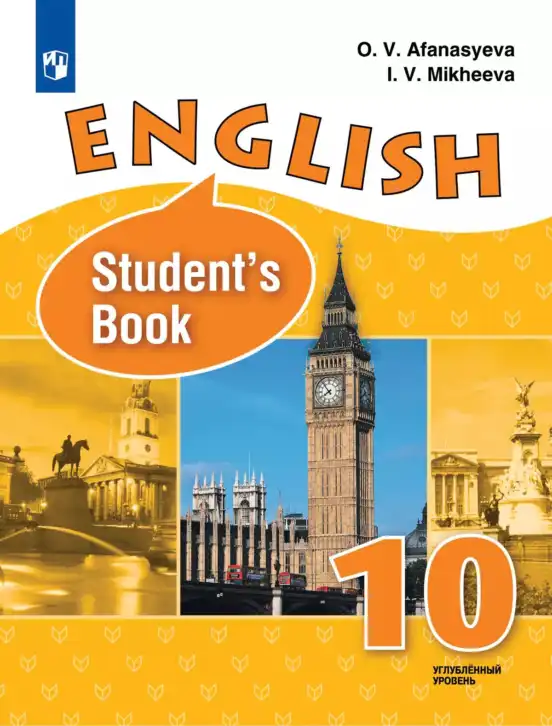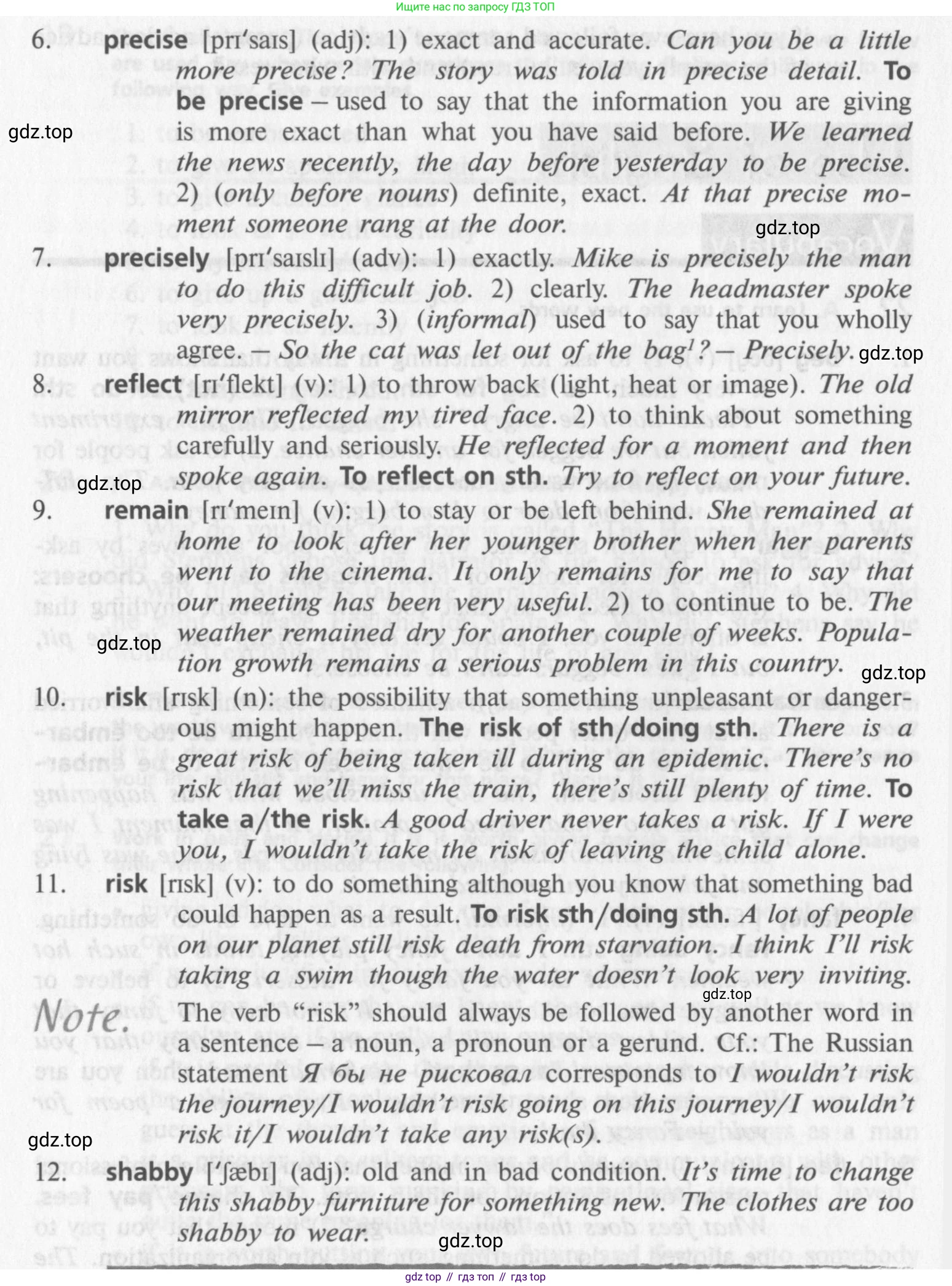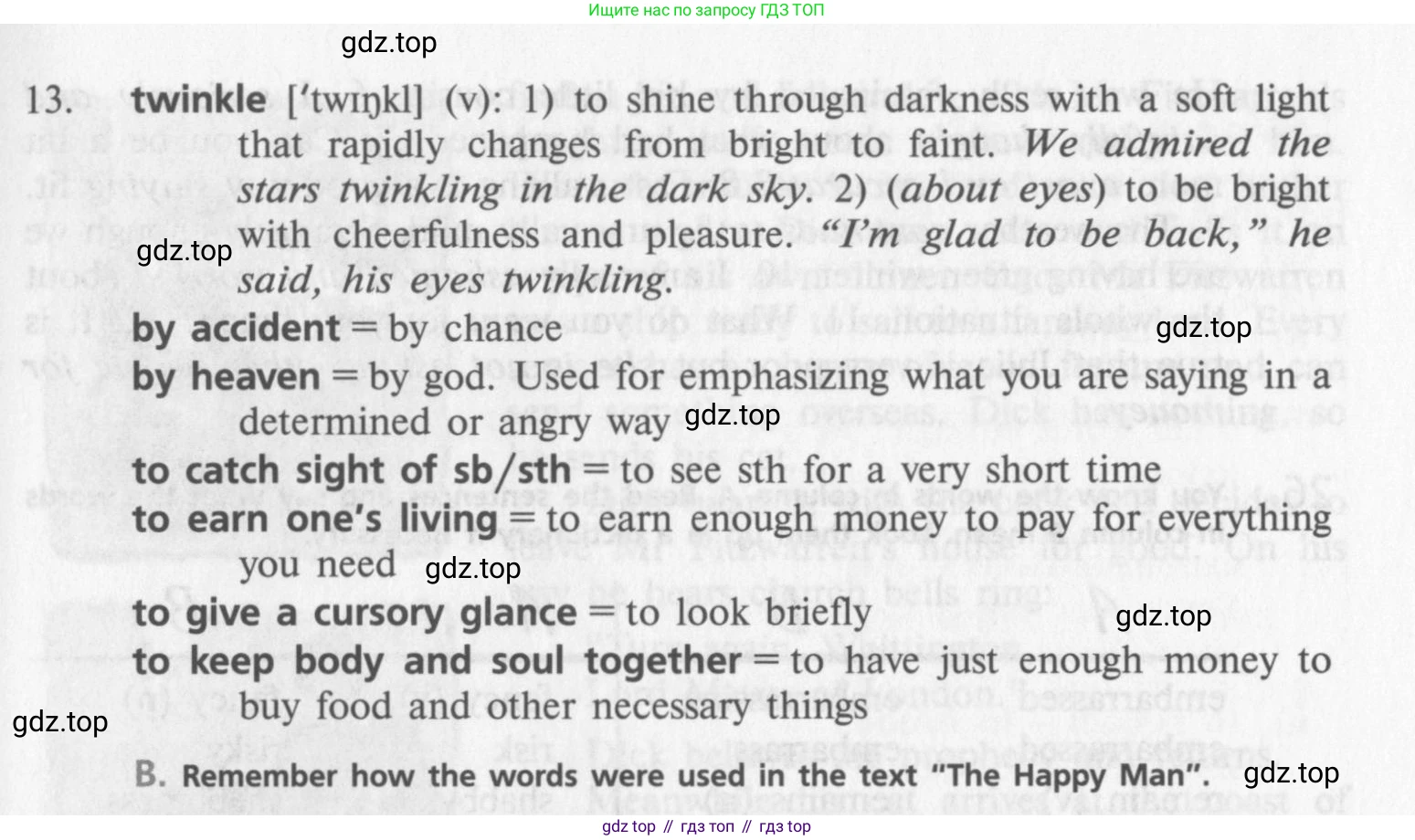Номер 22, страница 163 - гдз по английскому языку 10 класс учебник Афанасьева, Михеева

Авторы: Афанасьева О. В., Михеева И. В.
Тип: Student's book (Учебник)
Издательство: Просвещение
Год издания: 2014 - 2026
Уровень обучения: углублённый
Цвет обложки: белый, оранжевый с Биг Беном
ISBN: 978-5-09-027690-0
Популярные ГДЗ в 10 классе
Unit 4. Man — the Seeker of Happiness. Use of English - номер 22, страница 163.
№22 (с. 163)
Условие. №22 (с. 163)
скриншот условия



22. A. Learn to use the new words.
1. beg [beg] (v): 1) to ask for something in a way that shows you want it very much. To beg for sth, to beg sb (not) to do sth. "Please don't be angry!" she begged. The first experiment failed but we begged for another chance. 2) to ask people for money or food usually because you are very poor. The children went from door to door begging for money.
2. beggar ['beɡə] (n): someone who is very poor and lives by asking people for money or food. Beggars can't be choosers: (informal) used to say that you have to accept anything that is offered to you. I could only get a cheap seat in the pit, but I guess beggars can't be choosers.
3. embarrassed [Im'bærəst] (adj): ashamed of something and worried about what other people will think of you. To be embarrassed to do sth, to be embarrassed about sth. The boy understood what was happening but was too embarrassed to protest. At that moment I was somewhat embarrassed by my sister's words. Jane was lying and felt very embarrassed about it.
4. fancy ['fænsı] (v): 1) (informal) to want to have or do something. Fancy doing sth. I don't fancy playing tennis in such hot weather. What do you fancy for dessert? 2) to believe or imagine that something is true. It's not easy to fancy that your wildest dream will soon come true. Fancy that you know my sister! Fancy that! – (informal) used when you are very surprised about something. – I've written a poem for you. – Fancy that!
5. fee [fi:] (n): 1) (usually plural) money that you pay to a professional person or institution for their work. To charge/pay fees. What fees does the lawyer charge? 2) money that you pay to be allowed to do something, such as join an organization. The club charges a small fee of £3 a year.
6. precise [prı'saıs] (adj): 1) exact and accurate. Can you be a little more precise? The story was told in precise detail. To be precise – used to say that the information you are giving is more exact than what you have said before. We learned the news recently, the day before yesterday to be precise. 2) (only before nouns) definite, exact. At that precise moment someone rang at the door.
7. precisely [prı'saıslı] (adv): 1) exactly. Mike is precisely the man to do this difficult job. 2) clearly. The headmaster spoke very precisely. 3) (informal) used to say that you wholly agree. – So the cat was let out of the bag!'? – Precisely.
8. reflect [rı'flekt] (v): 1) to throw back (light, heat or image). The old mirror reflected my tired face. 2) to think about something carefully and seriously. He reflected for a moment and then spoke again. To reflect on sth. Try to reflect on your future.
9. remain [rı'meın] (v): 1) to stay in a set place or be left behind. She remained at home to look after her younger brother when her parents went to the cinema. It only remains for me to say that our meeting has been very useful. 2) to continue to be. The weather remained dry for another couple of weeks. Population growth remains a serious problem in this country.
10. risk [rısk] (n): the possibility that something unpleasant or dangerous might happen. The risk of sth/doing sth. There is a great risk of being taken ill during an epidemic. There's no risk that we'll miss the train, there's still plenty of time. To take a/the risk. A good driver never takes a risk. If I were you, I wouldn't take the risk of leaving the child alone.
11. risk [rısk] (v): to do something although you know that something bad could happen as a result. To risk sth/doing sth. A lot of people on our planet still risk death from starvation. I think I'll risk taking a swim though the water doesn't look very inviting.
Note. The verb "risk" should always be followed by another word in a sentence – a noun, a pronoun or a gerund. Cf.: The Russian statement Я бы не рисковал corresponds to I wouldn't risk the journey/I wouldn't risk going on this journey/I wouldn't risk it/I wouldn't take any risk(s).
12. shabby ['ʃæbı] (adj): old and in bad condition. It's time to change this shabby furniture for something new. The clothes are too shabby to wear.
13. twinkle ['twıŋkl] (v): 1) to shine through darkness with a soft light that rapidly changes from bright to faint. We admired the stars twinkling in the dark sky. 2) (about eyes) to be bright with cheerfulness and pleasure. "I'm glad to be back," he said, his eyes twinkling.
by accident = by chance
by heaven = by god. Used for emphasizing what you are saying in a determined or angry way
to catch sight of sb/sth = to see sth for a very short time
to earn one's living = to earn enough money to pay for everything you need
to give a cursory glance = to look briefly
to keep body and soul together = to have just enough money to buy food and other necessary things
B. Remember how the words were used in the text “The Happy Man”.
Решение не найдено
К сожалению, к этому заданию ещё не сделаны ответы.
Если вдруг Вы нашли ответ, пожалуйста, напишите его в
комментариях. Вы очень поможете остальным учащимся.
Другие задания:
Помогло решение? Оставьте отзыв в комментариях ниже.
Присоединяйтесь к Телеграм-группе @top_gdz
ПрисоединитьсяМы подготовили для вас ответ c подробным объяснением домашего задания по английскому языку за 10 класс, для упражнения номер 22 расположенного на странице 163 к Учебник (Student's book) 2014 года издания для учащихся школ и гимназий.
Теперь на нашем сайте ГДЗ.ТОП вы всегда легко и бесплатно найдёте условие с правильным ответом на вопрос «Как решить ДЗ» и «Как сделать» задание по английскому языку к упражнению №22 (с. 163), авторов: Афанасьева (Ольга Васильевна), Михеева (Ирина Владимировна), ФГОС (старый) углублённый уровень обучения учебного пособия издательства Просвещение.




















